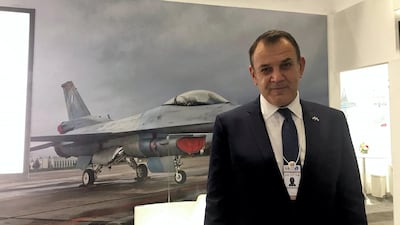Tensions between Turkey and other Nato members represent the biggest threat to the alliance’s cohesion, Greece’s Defence Minister said.
Nikolaos Panagiotopoulos said Greece was not seeking to isolate Turkey from a series of initiatives it agreed on with countries, including the UAE, to promote regional stability.
But he said Ankara must abide by international law and tone down its often inflammatory rhetoric to be included.
The already frayed relations between Nato members Greece and Turkey plummeted last year amid a row over maritime territory and access to gas reserves in the Eastern Mediterranean. The EU was dragged into the dispute, with the bloc backing member state Greece.
“The main threat to Nato’s internal cohesion comes from the strains between Turkey and other allies. I wouldn’t want to include just Greece in that,” Mr Panagiotopoulos told a webinar hosted by the Centre for Strategic and International Studies.
He referred to the tense situation last summer, when France temporarily withdrew support for Nato’s Mediterranean mission after a French frigate came precariously close to clashing with Turkish vessels.
While the Greek defence minister said the situation with Turkey had since improved, the tension of 2020 “ultimately serves to destabilise Nato’s cohesion”.
“But I do believe that in order to keep a stable and coherent Nato, especially in its south-eastern flank, we must make sure that tensions of this sort do not repeat themselves,” he said. “That’s the shared opinion of all our friends and allies in Nato and Europe.”
Last month, a landmark meeting in Paphos brought together senior foreign affairs officials from the UAE, Greece, Cyprus and Israel in order to strengthen their partnership.
Mr Panagiotopoulos said Greece wanted Turkey to be a good neighbour should it want to be included in similar partnerships.
“We would like Turkey – I don’t want to be misunderstood on that – to become a member of these schemes. But in order for that to happen, Turkey has to comply with the rules,” he said.
“I understand that Turkey has faced its own internal problems – economic problems, political problems that compelled President Erdogan to align himself with a more hardcore nationalist element within the Turkish political framework.
"But in order to be a reliable security providing actor in the region, I think that the first thing that one needs to do is to agree to comply by international law.”







